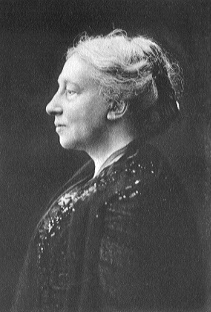Analysis of Credhe's Complaint At The Battle Of The White Strand
Augusta, Lady Gregory 1852 (Persse Roxborough, County Galway) – 1932 (Coole Park, )
And Credhe came to where her man was, and she keened him and cried over him, and she made this complaint: The Harbour roars, O the harbour roars over the rushing race of the Headland of the Two Storms, the drowning of the hero of the Lake of the Two Dogs, that is what the waves are keening on the strand.
Sweet-voiced is the crane, O sweet-voiced is the crane in the marshes of the Ridge of the Two Strong Men; it is she cannot save her nestlings, the wild dog of two colours is taking her little ones.
Pitiful the cry, pitiful the cry the thrush is making in the Pleasant Ridge; sorrowful is the cry of the blackbird in Leiter Laeig.
Sorrowful the call, O sorrowful the call of the deer in the Ridge of Two Lights; the doe is lying dead in Druim Silenn, the mighty stag cries after her.
Sorrowful to me, O sorrowful to me the death of the hero that lay beside me; the son of the woman of the Wood of the Two Thickets, to be with a bunch of grass under his head.
Sore to me, O sore to me Cael to be a dead man beside me, the waves to have gone over his white body; it is his pleasantness that has put my wits astray.
A woeful shout, O a woeful shout the waves are making on the strand; they that took hold of comely Cael, a pity it is he went to meet them.
A woeful crash, O a woeful crash the waves are making on the strand to the north; breaking against the smooth rock, crying after Cael now he is gone.
A sorrowful fight, O a sorrowful fight, the sea is making with the strand to the north; my beauty is lessened; the end of my life is measured.
A song of grief, O a song of grief is made by the waves of Tulcha Leis; all I had is gone since this story came to me. Since the son of Crimthann is drowned I will love no one after him for ever; many a king fell by his hand; his shield never cried out in the battle.
After she had made that complaint Credhe laid herself down beside Cael and died for grief after him. And they were put in the one grave, and it was Caoilte raised the stone over them.
| Scheme | X X X X X X A X X X A |
|---|---|
| Poetic Form | |
| Metre | 011110110111011010111010101101011001011011011010101010110111110111101 111011111010010101101111111010100111111100101 1000110001011100010110010110100101 1000111000110100111101110101101011100 10011110011011010110110110101011011011101111011 11111111110110110111110111011111111101 01011010101110101111111010101111111 010110101011101011011001011101011111 010011010010111010110111011001111110 01111011111101111111111110111101111111111101110100111111110110010 10111101110110110111101010100110111101101 |
| Characters | 2,024 |
| Words | 416 |
| Sentences | 14 |
| Stanzas | 11 |
| Stanza Lengths | 1, 1, 1, 1, 1, 1, 1, 1, 1, 1, 1 |
| Lines Amount | 11 |
| Letters per line (avg) | 141 |
| Words per line (avg) | 37 |
| Letters per stanza (avg) | 141 |
| Words per stanza (avg) | 37 |
Font size:
Submitted on August 03, 2020
Modified on March 05, 2023
- 2:04 min read
- 4 Views
Citation
Use the citation below to add this poem analysis to your bibliography:
Style:MLAChicagoAPA
"Credhe's Complaint At The Battle Of The White Strand" Poetry.com. STANDS4 LLC, 2024. Web. 27 Apr. 2024. <https://www.poetry.com/poem-analysis/55638/credhe%27s-complaint-at-the-battle-of-the-white-strand>.


Discuss this Augusta, Lady Gregory poem analysis with the community:
Report Comment
We're doing our best to make sure our content is useful, accurate and safe.
If by any chance you spot an inappropriate comment while navigating through our website please use this form to let us know, and we'll take care of it shortly.
Attachment
You need to be logged in to favorite.
Log In